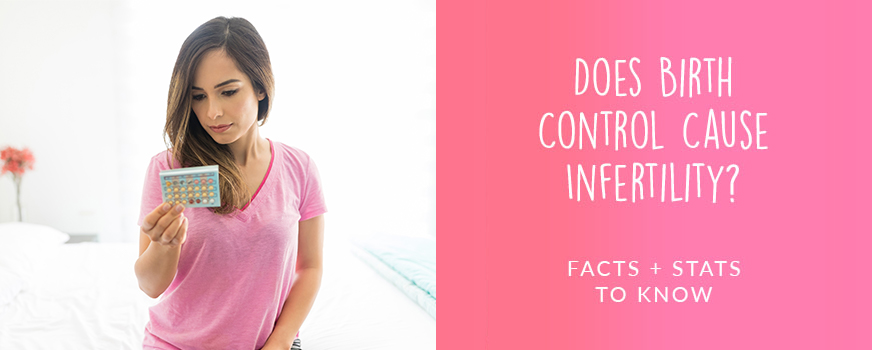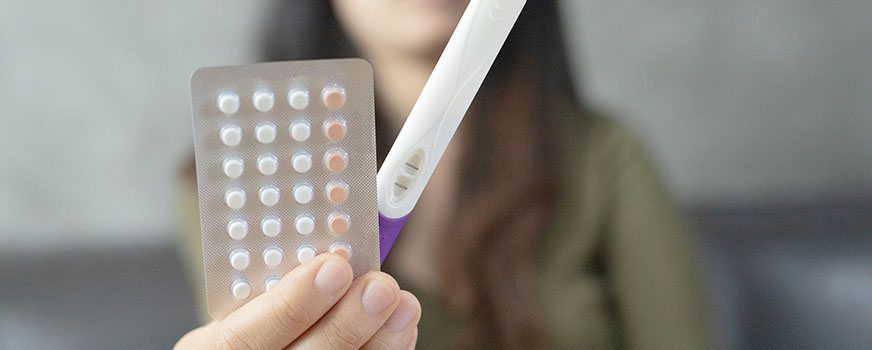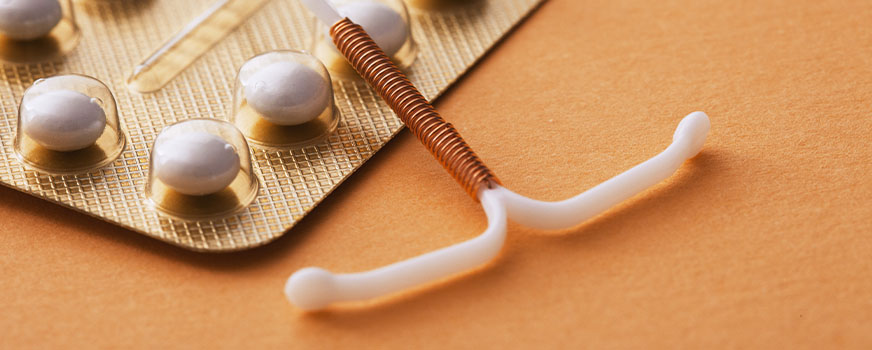
Can birth control affect your fertility? This question is often a concern for those taking contraceptives who one day would like to grow their family. Read more about birth control infertility statistics so you can have peace of mind when it comes to your fertility health and future family planning.
How Birth Control Works
Most forms of birth control contain levels of progestin and estrogen, which are the two hormones that are responsible for fertility. By altering the levels of these hormones, birth control can prevent the body from ovulating, change cervical mucus to make it harder for sperm to enter the cervix, or change the uterine lining so that eggs can’t attach. These hormonal treatments can affect different women in different ways. And it leaves many women with the question: does birth control cause infertility?
Can Birth Control Affect Fertility?
The chances of your birth control affecting your long term fertility are very low. In fact, the idea that birth control causes infertility is a widely known myth. There are many side effects and sometimes long term risks associated with hormonal contraceptives. But infertility is not one of them
It is important, however, to note that getting pregnant is not as easy as it seems, and it’s an individual journey for every woman looking to become pregnant. Every woman’s body will respond differently after stopping birth control, but research shows that your fertility will not be affected. But it is entirely possible to become pregnant after stopping birth control!

Birth Control Infertility Statistics
In a large study on birth control and its effect on fertility, researchers looked at women who had been using hormonal birth control for seven years. Once they stopped using birth control, 21.1% of the women conceived in their first fertile month. Of those who didn’t conceive right away, 79.4% got pregnant within a year.
Another study followed women who had just stopped taking the birth control pill and compared them to a group of women who had never taken birth control pills. The study found that 57.9% of the women who had discontinued the pill had ovulated within their first post-pill cycle. However, many of these women also experienced shorter menstrual cycles and luteal phases. This irregularity eventually corrected itself after 9 months post-pill to match the cycles of the women who had never taken oral contraceptives.
Menstrual Cycles After Birth Control
One of the most common side effects of discontinuing birth control is an irregular period. Many women experience longer cycles, irregular periods, cramps, and spotting in between periods for some time after stopping birth control. Usually their cycles will return to normal after a period of time, but it is very common to experience irregular periods for some time.
Birth Control’s Effect on Ovulation
Hormonal birth control works in two ways: first by thickening the mucus on the cervix, and second by preventing ovulation. When you don’t ovulate, you cannot become pregnant. Once you stop using hormonal birth control, ovulation will eventually resume. However, it takes varying amounts of time for it to return. Ovulation can resume immediately in some cases, but for some women it can take years for ovulation to return. Different forms of birth control will cause your body to respond differently, and it really depends on the woman.

Does Type of Birth Control Matter?
There are a number of forms of birth control that are the right option for many different women. It’s important to note that these different types of birth control also function in different ways that may affect your body differently, so it’s a good idea to talk to your doctor about what’s right for you.
The Pill
The pill is one of the most common forms of birth control and it is taken orally every day and is 91% effective in preventing pregnancy. The hormones in the pill prevent ovulation and thicken mucus in the cervix, which prevents sperm from entering. While taking the pill, it’s important to be diligent about refilling your prescription and taking the pill at about the same time every day.
Research has shown that taking the pill doesn’t cause infertility, but it will take a few months after stopping the pill for fertility to return. Some studies have even shown that the pill may aid in fertility after stopping the pill. There are also some side effects associated with taking the pill that affect women differently.
The Shot
The birth control shot is 94% effective and requires an injection once every 3 months. It works by preventing ovulation as well as thickening cervical mucus. You do, however, have to schedule regular appointments to receive the shot. Sometimes you are able to administer the shot yourself at home. Many women stop having their period while receiving the shot, but your period will usually return within 6 months of the last injection once you stop. Most women will be fertile 5 to 7 months after their last injection, but for some women it can take up to two years for fertility to return. The shot typically comes with the longest period of time between discontinuation of the treatment and the return of ovulation and fertility.
The Implant
The implant is 99% effective and lasts up to 5 years. It’s a good low-maintenance option that is implanted under the skin of your upper arm and is a good option for many women. It works in two ways: first, by preventing ovulation, second, by thickening mucus in your cervix and preventing sperm from swimming through. There are a number of mild side effects that some women may experience as well as risks associated with the implant.
Implants do not affect a woman’s ability to become pregnant, as they stop working as soon as they are removed. However, if you do become pregnant while using the implant, there is a slightly higher chance of an ectopic pregnancy (occurring outside the womb).
The IUD
An IUD is a small device put into your uterus that is 99% effective in preventing pregnancy and can last 3-12 years. IUD stands for Intrauterine Device and there are two different kinds: copper and hormonal. IUDs work by changing the way sperm cells move so that they can’t reach the egg. There is no evidence that IUDs affect fertility after their removal. There are, however, a few side effects including irregular periods and pain at the insertion site.
The Patch
The birth control patch is 91% effective and must be replaced weekly. The patch provides convenience as long as it is used correctly. It works by preventing ovulation and thickening mucus on the cervix. There are a few side effects and health risks associated with the patch, but they are similar to those of other hormonal types of contraception. There is no evidence that the patch affects fertility after use, and most women will see ovulation return within three menstrual cycles after discontinuing the patch.

What to Expect When Stopping Birth Control
Due to the fact that many birth control methods alter the levels of hormones in your body, it’s common to experience side effects either when you start new birth control or just after you stop. It’s also important to note that you can also get pregnant as soon as you stop birth control. Some side effects include the following:
- Irregular periods
- Hormonal acne
- Mood swings
- Heavier periods
- PMS
- Weight loss
- Minor hair loss for about 6 months
- Increased libido
- Lower vitamin D levels
Every woman can have a different experience when stopping birth control. You may experience some of these side effects, but you also might not experience any at all.
Different forms of birth control work well for different women. Talk to your doctor about what form of birth control is best for you and learn about the different side effects that birth control might cause. If you’re already taking birth control and thinking of stopping, it’s also a good idea to talk to a fertility specialist about what to expect and what is normal. Feel confident in the fact that taking birth control will not affect your chances of getting pregnant in the future.
Sources
- https://americanpregnancy.org/unplanned-pregnancy/birth-control-pills-patches-and-devices/birth-control-patch-5032/
- https://www.nexplanon.com/side-effects/
- https://www.plannedparenthood.org/learn/birth-control/birth-control-implant-nexplanon
- https://www.plannedparenthood.org/learn/birth-control/birth-control-pill
- https://www.plannedparenthood.org/learn/birth-control/birth-control-pill/birth-control-pill-side-effects
- https://www.plannedparenthood.org/learn/birth-control/birth-control-patch
- https://www.plannedparenthood.org/learn/birth-control/birth-control-shot
- https://www.plannedparenthood.org/learn/birth-control/iud
- https://www.plannedparenthood.org/learn/birth-control/iud/iud-side-effects
- https://www.verywellfamily.com/when-will-you-get-pregnant-after-depo-provera-1959946
- https://www.webmd.com/sex/birth-control/news/20020827/birth-control-pills-may-aid-fertility



